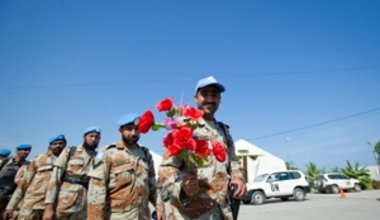The People and The Land - Making Farming Practices Sustainable in Timor-Leste
Dili, 25 June 2010 - "When people in my village see these farming techniques working, they all come calling on me, wanting me to show them how to introduce these new practices to their own land".
It's day two of a week long training course on sustainable land management in Ermera. Felisberto Pereira Pinto is one of the trainers, describing firsthand how these ideas and techniques can benefit local people.
The 26 students are a mixture of environment agents, forest guards and Government field representatives. They will take the knowledge and information they acquire this week back to their respective sucos, to help other farmers in their communities.
Victor de Deus Maia has been a Government environment officer in Ermera for just over a year, but, he says, "this training is totally new to me because it provides specific technical information on how to maintain land without causing damage. For example, I now know how to use an A Frame to mark contour lines for terracing, and when planting trees what is the correct spacing distance to use."
The students listen intently as the three trainers use a slide show, diagrams and group exercises to explain new farming techniques. The next step is the practical exercises. One half of the class starts to physically build a small area of terracing in a nearby field. The other half heads to the plant nursery, where the students enthusiastically question the trainer about the right ratio of sand, compost and soil that is needed when preparing a plant bed.
"How to prepare Casuarina and Eucalyptus seedlings is of particular interest to me", says Jeneveva de Fatima Ximenes. Each type of tree exists in her village, but they haven't been maintained or propagated.
UNDP's Sustainable Land Management programme aims to encourage - and teach - land management practices in Timor-Leste, which maintain
ecosystem productivity and also contribute directly to the environmental, economic and social well-being of the country.
One part of the programme has been the training of over 80 individuals from a variety of institutions, including the Ministry of Agriculture and the Secretariat of Environment and national NGOs. The trainees then go out to the districts and become trainers, as this course shows, imparting their newly acquired knowledge to suco (village) representatives, who in turn take the information back to their communities.
The trickle down effect of the training means that sustainable land management practices are being successfully employed throughout the country.
"Many people have started to improve their farming techniques", says the trainer, Felisberto Pereira Pinto. "One example is in Ainaro where several people are now effectively terracing on slopes and dividing their land into different components".
Mr Pinto is also keen to emphasise that the key to sustainable farming is integration:
"All the elements of this training are linked. People need to start farming with a holistic plan for their land. So perhaps they take one hectare and divide it into compatible activities, which produce rewards at different points in the farming cycle. Trees for timber (and oil in the case of sandalwood), then short term crops, like corn, and then cattle and goats for dairy products and meat."
About 60% of the land in Timor-Leste is sloping, so farming on an incline is a necessity. Without terracing and drainage systems the heavy rains wash away crops and cause large-scale erosion. Deforestation, and the use of the slash-and-burn farming technique, also leaves the land exposed. It's vital that the people of Timor-Leste tackle these issues, to increase agricultural productivity and protect their land from damage.
Paula Cruz is the Project Manager for the UNDP programme. She says, "these trainees will now be able to run courses in their sucos. They will also be able to use their own land to demonstrate how successful these techniques can be. The best way to get the message across is to lead by example".
One such trainee, Victor de Deus Maia says, "communities often have farming habits that are hard to change. It will take time for people to adapt. But I want to do my best and show the people in my community that the changes are worth doing."
--------------------------
Clare Santry
Media and Communications Officer
UNDP Timor-Leste
Office: (+670) 331 2481 x2019
Mobile: (+670) 7245425
Fax: (+670) 331 3534
Email: clare.santry@undp.org
Web: www.tl.undp.org
 UN
UN United Nations Peacekeeping
United Nations Peacekeeping



